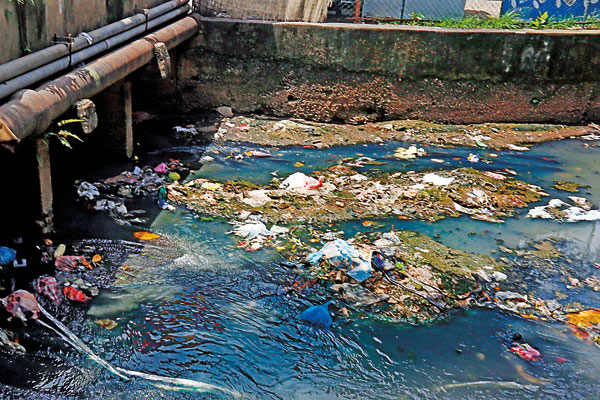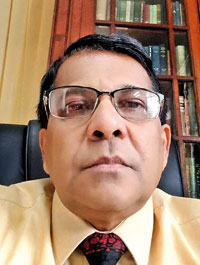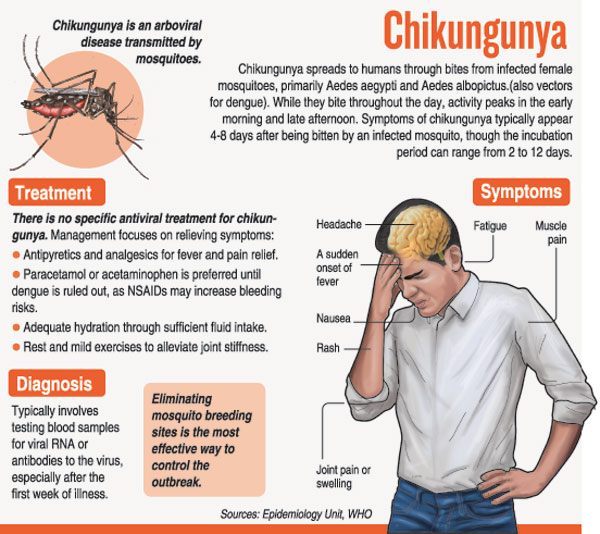News
Chikungunya danger rises with dengue mosquito
View(s):By Kasun Warakapitiya
Health authorities are calling for intensified dengue control programmes to control sporadic cases of Chikungunya spreading in Colombo city.
The National Dengue Control Unit (NDCU) Director, Dr Sudath Samaraweera said robust dengue mosquito eradication programmes and setting up strong campaigns to destroy mosquito breeding areas would help control both dengue and sporadically reported Chikungunya cases.
The periodic emergence of Chikungunya could be related to immunity among people.
“If more people get the virus infection the community could develop immunity, however, with time, people who are not exposed as well and are not immune could get infected and that may lead to outbreaks,’’ he said.

Ideal breeding ground: An open drain with infamous plastic bags. Pix by M.A. Pushpa Kumara
Dr. Samaraweera said that during the 1960s dengue was reported sporadically, yet it was only in 1996 that dengue was declared a notifiable disease. The Health Ministry decides whether to declare a disease notifiable or not depending on its public health impact and other factors. Chikungunya is not a notifiable disease so far.
The former chief medical officer of the Colombo Municipal Council, Dr Ruwan Wijayamuni told the Sunday Times that the dengue mosquito is considered the nastiest mosquito species out of 110 species.
He pointed out that both Aedes aegypti and Aedes albopictus
species are the vectors of dengue 1, 2, 3 and 4 types, Chikungunya virus, Zika virus and yellow fever.
Dr. Wijeyamuni said dengue too, which was initially reported sporadically, later become endemic (certain number of cases reported every month) and during the monsoon season outbreaks occur time to time developing into epidemic proportions.
He called for immediate vector control as the dengue mosquitoes contribute to deadly dengue and the debilitating pain-inducing Chikungunya.

Dr. K. Sriprathapan
When 8,608 dengue cases were reported island-wide in January and February, Chikungunya cases were only reported sporadically.
Colombo city, too, reported sporadic cases, yet many remain underreported as most patients do not seek hospital admission.
The Acting Chief Medical Officer, Dr K Sriprathapan, told the Sunday Times that while dengue cases are a persistent concern in Colombo, there have not been consistent reports of Chikungunya within the city limits.
Even though there is a hospital-based surveillance system for Chikungunya, it does not reflect actual cases as most patients are managed by the general practitioners or by the outpatient department doctors of hospitals. “The difficulty in tracking and diagnosing Chikungunya cases has led to challenges in creating an effective response system,’’ he said.
To combat the spread of mosquito-borne diseases, the CMC has taken measures such as inspecting breeding sites, source reduction programs including fogging and spraying, issuing notices and taking legal actions against the premises.
However, residents of Kirulapone, Narahenpita areas claimed that there were many cases being reported and blamed the lack of fogging and mosquito eradication work.
A senior health official said lands in Kirulapone and Narahenpita are larger and have bigger garden areas where mosquitoes could find breeding places and habitats. According to him there are some houses whose owners may be abroad.
He said that the showers in February-March had contributed to the breeding of mosquitoes.
He also claimed that they were carrying out dengue eradication programmes that included fogging and spraying chemicals whereever mosquito larvae were found.
Chief Public Health inspector, D.S Kumara said fogging and spraying is done in six MoH areas within Colombo city limits, while teams will do routine inspections of public places during the New Year.
He said that a special dengue control programme announced by the NDCU during March 27, 28 and 29 was undertaken where 7,406 houses were checked and 725 identified as potential mosquito breeding places. And 105 mosquito breeding sites with mosquito larvae were identified. Of these, 572 places were corrected, while 199 residences were given a red notice. Legal action was taken against 92 houses.

The best way to say that you found the home of your dreams is by finding it on Hitad.lk. We have listings for apartments for sale or rent in Sri Lanka, no matter what locale you're looking for! Whether you live in Colombo, Galle, Kandy, Matara, Jaffna and more - we've got them all!

